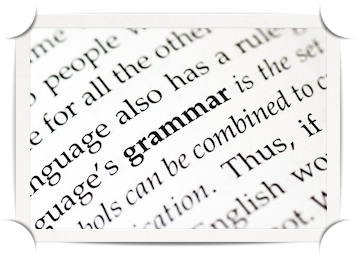 So you’re into blogging and writing your own posts. You’ve learned the basics on how to write, how to create interesting content, what your readers want to see, Internet Marketing tips and tricks, and the like. But do you really know what it takes to perfect your content as far as proofreading and correct grammar are concerned? We can’t all hire our own proofreaders, and we don’t all have the expertise of grammar teachers.
So you’re into blogging and writing your own posts. You’ve learned the basics on how to write, how to create interesting content, what your readers want to see, Internet Marketing tips and tricks, and the like. But do you really know what it takes to perfect your content as far as proofreading and correct grammar are concerned? We can’t all hire our own proofreaders, and we don’t all have the expertise of grammar teachers.
We’ve all seen the flame wars that start under even the slightest of spelling or grammar errors. Besides the basic grammar rules that everyone must keep in mind, there are things that just plain stand out: the most important grammar rules all bloggers need to know.
Spelling Rules / Word Differences
- I’m not even going to BEGIN on spelling correctly. Spellcheckers galore, programs and utilities you can use to check spelling and grammar errors – even the most basic of free text editors have spellcheckers.
- If your word processor or spreadsheet doesn’t have a spellchecker, or you write in another language and can’t find the right plugin, use something else that will help you – just copy and paste your text into the utility and there you go! Plus, there are so many resources, websites and dictionaries that tackle the most misspelled words (one of them, in fact, is “misspelled” itself) that can prove totally handy when you’re writing.
- Another huge mistake we always see, are slight differences between words and use of the wrong one, like affect vs. effect, i.e. vs e.g. and who vs. whom. (Tip: use “whom” if you can answer the question with “him”!). The biggest mix-up we see most often is loose and lose, the one in place of the other. This happens mostly because of English pronunciation rules that get us so confused! Mistakes of this nature may not only tick red pens (like me!) off, but it can also make readers miss the point completely. Like the difference between “complimentary” and “complementary“, or “pretty” and “petty“!
Punctuation Rules
- Read up about the difference between punctuation marks, like the colon, semicolon, and comma. Just keep in mind that commas join two independent clauses, set off elements outside the main clause, and are generally used for clarity and convenience. Colons set off a list, and a semicolon, a cross between a period and a comma, connects two independent clauses that are closely related. Don’t be afraid to use these punctuation marks; they can really help you enhance your text. The comma is one of the strongest punctuation marks you should learn to use correctly! There are little tips like the Oxford comma you should be wary about. There are tons of articles that can help you learn about where to use commas, semicolons and colons!
- Where do you put punctuation marks, when you’ve got parentheses and quotation marks? Now, there’s a good question! First of all, let me point out that placement of punctuation inside quotation marks is different in the United States than it is in the United Kingdom. For now, we’ll talk of the American Rules, which tend to be more complicated. To make a long story short, we put commas, periods, exclamation points and question marks inside the quotation marks when they are part of the quote. If they are not part of the quote, we leave them outside. Example: Should we believe it when she says, “I don’t feel like it”? compared to We can ask anyone, “what time is it?” We don’t need to follow with a period. Check out grammarmonster.com for the differences between UK and US quotation mark rules! The exact same thing goes for parentheses, but you need another punctuation mark, like a comma or a period, to follow and close them!
Capitalization Rules
- Read up about when to properly capitalize words. You’ll notice that lots of times, titles aren’t all capitalized, but just use sentence capitalization (only the first word is capitalized). As GrammarBook.com states: “Always capitalize the first and last words of titles of publications regardless of their parts of speech. Capitalize other words within titles, including the short verb forms Is, Are, and Be. Exception: Do not capitalize little words within titles such as a, an, the, but, as, if, and, or, nor, or prepositions, regardless of their length.” Also, just like the capitalization of “GrammarBook.com,” be wary of camel cases, or capitalization of letters inside a word. You can see examples of camel cases in words like “iPod” and “LaForge.”
Tense Rules
- Tense rules in English grammar are about the use and consistency of the past, present and future tenses in sentences, when and how to use each one, and the use of indefinite, continuous, perfect, and perfect continuous. What you really need to analyze here, and learn off by heart, is what time you’re referring to – which tense you are speaking in. Is it now? Yesterday? Already? Since? For how long? By the time? Stating guesses? It will take tons of practice and cheat sheets, but it will grow on anyone who chooses to read up and learn naturally. These mistakes are made mostly by people who use English as a foreign language. I’m not going to analyze each one – that would need many separate articles – but speakspeak.com has a wonderful resource on tense rules in English grammar!
Grammar Rules for Numbers
- If you’re going to mention single digit numbers, write the word – spell it out! If you’re going to mention double digit numbers, use the number! Be consistent if you have numbers in two categories (either spell them all out or use numbers for all of them). Simple fractions should be spelled out (and don’t forget to use hyphens), but use numbers for decimals. Percentages should be written in numbers. For years, you can spell it out, use a number, or a decade: “the nineties, the ’90s, 1990s.” They’re all correct! For time, you should spell out the time when it’s followed by o’clock, or doesn’t have A.M. or P.M. after it. Exception: Whenever a number begins a sentence, it should always be spelled out!
- Also, I bet you didn’t know this one about dates: when using full dates, we don’t use ordinal numbers (“August 12th, 2012” is incorrect!). I must admit, that before writing this article, I didn’t know it either!
Plural and Possessive
- Here’s another huge grammar mistake: the difference between words that sound the same. Yeah, you’ve got it – like you’re and your, their, there and they’re, etc. The main difference is knowing when to use the plural and when to use the possessive. This is also where correct apostrophe use comes into play. We make most singular nouns possessive by adding an apostrophe and an “s” at the end! So, never use an apostrophe unless you want to make the word possessive! This Capital Community College page has a wonderful guide to using possessives. Also, if you’re making a noun already ending in “s” possessive, like “business” or “Mrs. Belkins,” all you have to do is add the apostrophe.
Was were where grammar rules
- Here’s a tough one: when do you use “if I was” and when do you use “if I were?” This is actually a case of hypothesis. When you use “if I were,” the past subjunctive, you’re speaking of something that is contrary to fact. This is best seen in the phrase “if I were you,” which can never be true. On the other hand, “if I was,” the past indicative, refers to a condition that is not certain. “You should tell me if I was doing a bad job.” And please, don’t use “where” in these cases – this has nothing to do with place!
Finally, when you’re not sure about how to write something, ask Google! It’s not a shame to not know something – besides, no one will ever find out! I mean, I consider myself a grammar Nazi, but we all forget what some words mean, or how they’re spelled. I check words all the time! We have a plethora of weapons for battling our forgetful brains!
Don’t get me wrong, I’m not talking about total nit-picking. It’s true, with the extensive use of the Internet, we’ve just plain forgotten how to write correctly. (I’m sure I’ll have more than a few grammar mistakes in this post myself!). I’m talking about the basics; the things that drive people crazy and will send them into a flame comment fury!
Just remember that there’s no excuse anymore. Bad spelling and bad grammar can be battled, even if English isn’t your native language. There are so many utilities and workarounds, that you can be virtually error-free! No flame from red pens anymore!
So, how many mistakes did I have in this post? Please, help me out and catch what I couldn’t!


Great post, Vicky. I struggle with grammer a lot. Most of my past writing has been done with a proofreader or editor nearby. I have a copy of Elements of Style nearby, but I write so fast these days it’s easy to loose track of what I’m doing. This is great advice.
I’m really glad you liked the article, Yordie! It does help to keep handy things like that nearby!
You know they used to teach this stuff at school when I was young ?
You mean they don’t teach this in school anymore? I mean, I haven’t been in touch with any school system in years, but not teaching these rules just sounds silly!
This is a useful refresher, plus a few new tips for me to consider
I’m happy you find the article useful and refreshing, Drew!
This article was a really great refresher. They taught some of this when I was in middle school, but I honestly haven’t had a real grammar lesson since then. In highschool it was about learning to evaluate literature and as an English major in college they simply expected you to already know it.
Comments on your grammar below. (Well you did ask!)
“Just keep in mind that commas join two independent clauses, set off elements outside the main clause, and is generally used for clarity and convenience” should be “Just keep in mind that commas join two independent clauses, set off elements outside the main clause, and ARE generally used for clarity and convenience”.
“The exact same thing goes for parentheses, but you need another punctuation mark, like a comma or a period, to follow and close it!”
What does ‘it’ refer to? Last time I looked “parentheses” was the plural form.
Bridget, thank you SO much for taking the time to check out the post. You’re absolutely right! I’ve made the changes. This is why you need as many pairs of eyes as possible!
:-)